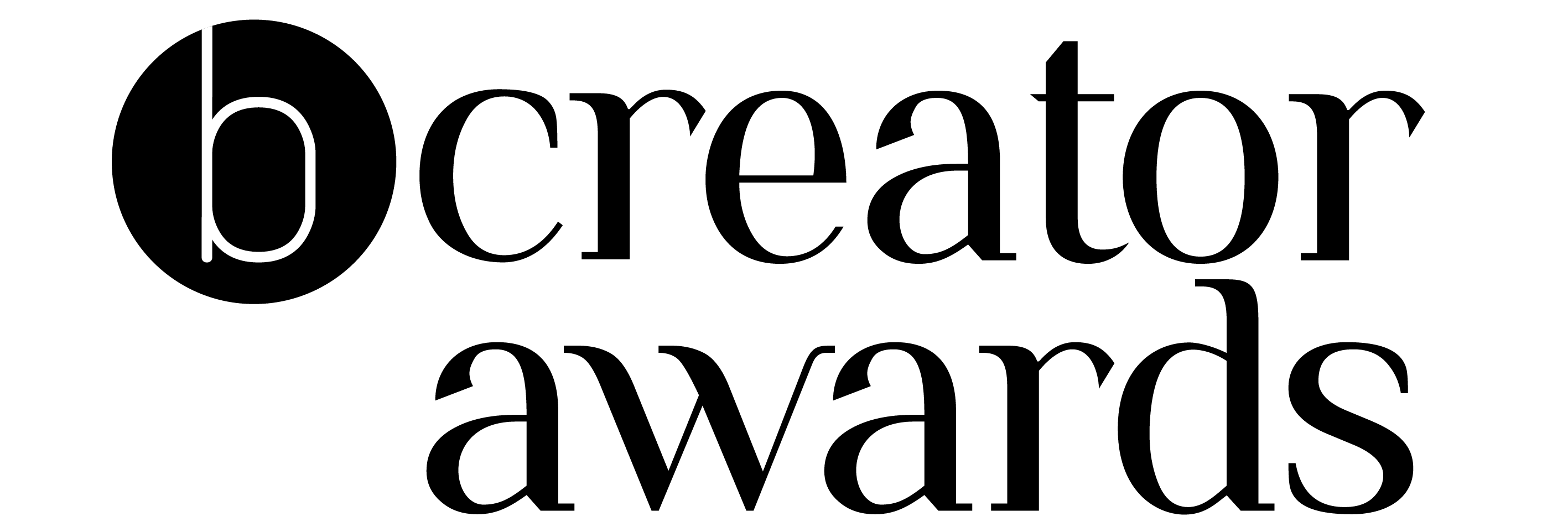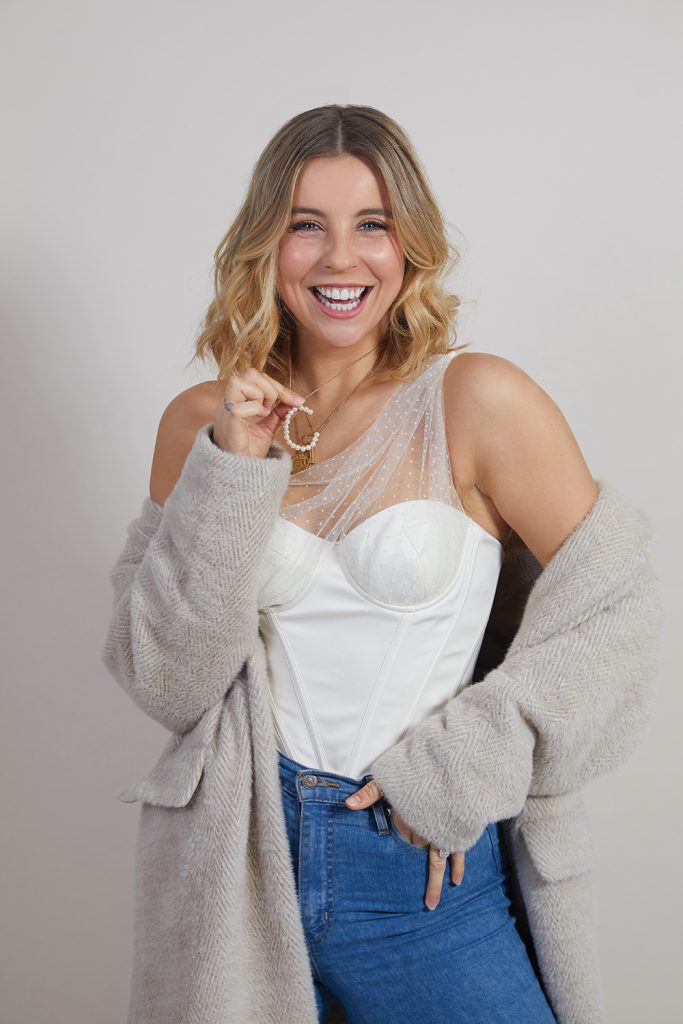
Chessie King is luminous – she glows, and you glow after speaking to her. Today, on our set, her energy is contagious. The day is a blur of backdrop and outfit changes – all bright and colourful.
Although we’re still in the confines of winter, Chessie has somehow managed to create a cocoon of summer in our studio. After snapping our final shot, we sat down with the 26-year-old body confident influencer to ask her some of our burning questions.
How did you use Instagram before you started posting body confident content?
I used Instagram almost just to show what I was doing with presenting, so I showed little clips of me interviewing people. I also created a thing called Secrets, which was a little roundup of my favourite places around the world. So I would have London Secrets, California Secrets, Amsterdam, Stockholm, Copenhagen – and they would be 15-second videos, because that’s the maximum that Instagram would do, and it would basically show the atmosphere, the food, and the restaurant.
Then I would do a little breakdown of the price, I would show the price with the moneybag emojis – one being quite cheap, five being expensive. Then the healthy options, so I was showing healthy places to eat with your family and friends, so I would rate that out of bananas, so one to five bananas.
Then I’d say what it was best for, if it was best for a date scenario or to take your family or to go with your sister or work colleague. Then I was also posting a lot of fitness content, a lot of workouts and yeah – hopefully they were easy to follow videos, but it kind of went through different stages and evolved into body confident posts.
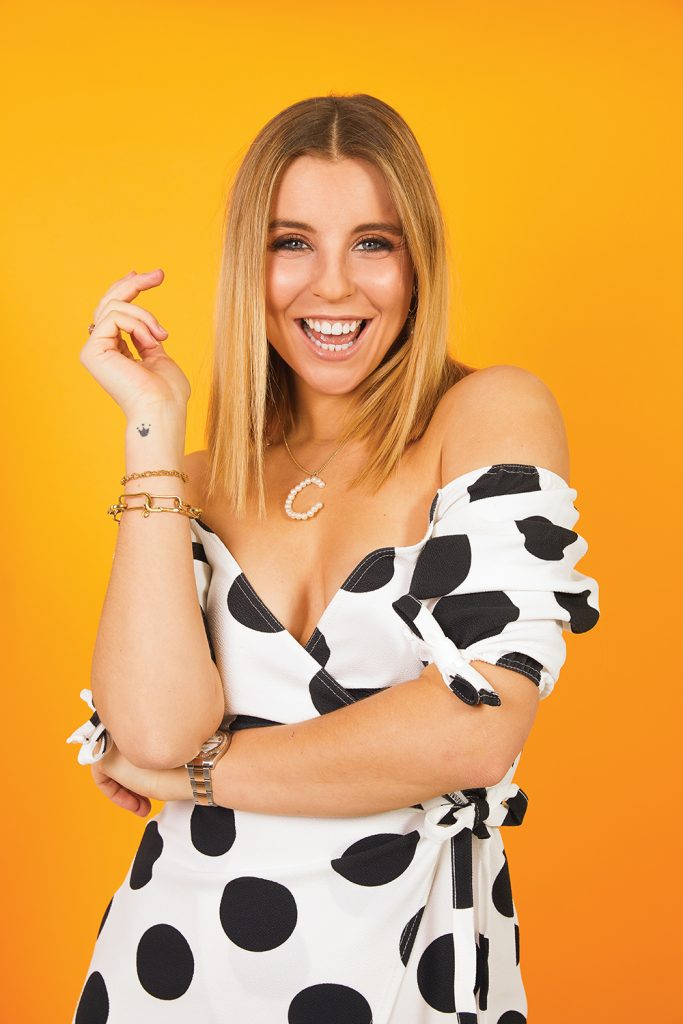
When did you start posting more body confident content online and what encouraged you to do it? Did it feel like a big step? What was the initial reaction like when you began posting?
It was around three and a half years ago that I posted my first transparent photo. It was my jeans just undone and my belly hanging out after a big Sunday roast. I think I’d had a really intense week of just negative body image thoughts, and I feel I’d got to the point where I couldn’t relate to anyone online, just because it was a sea of perfection, and I was adding to that perfection because that’s all I really knew. That’s what Instagram was – it just became the norm to edit your body, and everyone was doing it, so I thought that was what Instagram was.
It was a giant step because it felt like I just wanted to change my reason for using the platform, and I wanted to use my voice to speak out and be like ‘look this is what I look like, I know that you’ll probably be feeling like this at some point during your lives too’. If we can start sharing real life, and start sharing normality, and being like ‘look, I look like this, you probably look like this, your sister, your colleague, your boss – everyone looks like this when they sit down, or everyone’s got little lines on their bottom or on their, I call it my second bum’.
The initial reaction was really positive, it was almost like a sigh of relief and everyone going ‘finally someone is actually just being real and being what everyone else needs to see’ – it’s that relatability. It was a big change, a big shift, and that was when everything started changing.
What do you think have been the biggest impacts from the body confident movement so far?
There are some incredible people on Instagram who are spreading body confidence and just really supporting those that need it. I just say, I wish we could bottle up a little bit of them and prescribe it as medicine to those that need a little bit more self-belief, selfappreciation, self-celebration.
I think the biggest impact of the body confident movement is the appreciation of what our bodies do for us, and the realisation that we are all struggling with body confidence, we are all struggling with body issues and we really should just step outside of what our bodies look like and appreciate them for what they are doing, like the functions.
I try and think of it like a biology lesson – we’re stripping back the first layer of ourselves, so what’s beneath our skin and be like, wow my brain is thinking, filtering through all the knowledge that I give it, it’s also thinking for me, it’s creating ideas constantly, and then going down to my heart, and my heart is beating for me and as someone with heart problems and having a heart operation in a few weeks I think it’s so important for me.
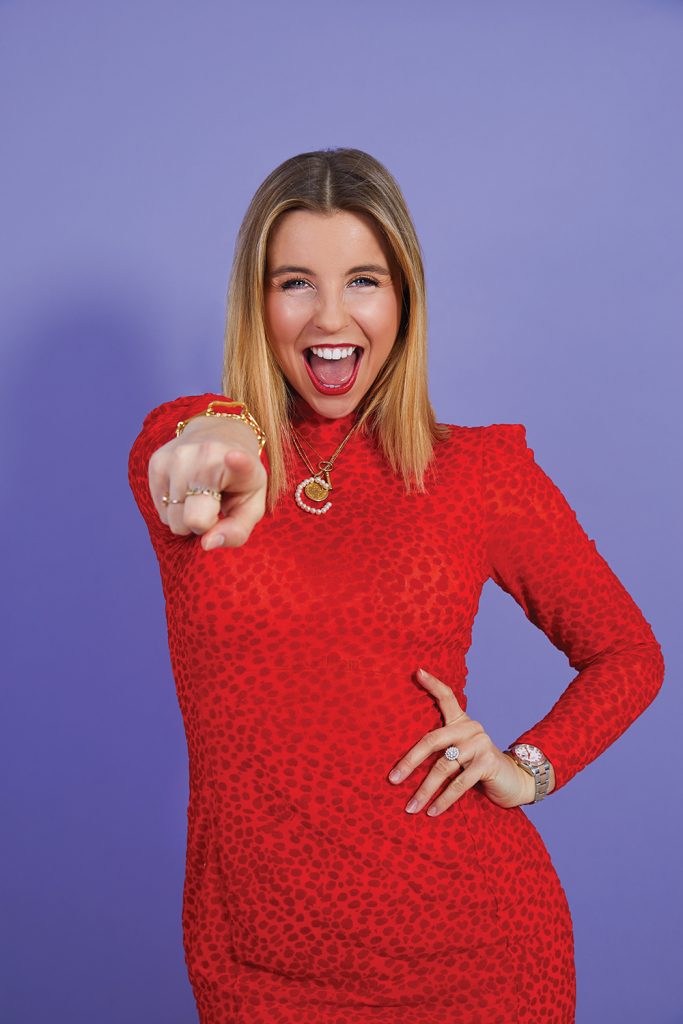
It’s made me realise how incredible the centre of our bodies is, and that it’s just keeping us alive without us having to tell it what to do. I think beneath our stomach, everyone’s so obsessed with stomachs, this ideal, this perfection that none of us can live up to, and then just going beneath the stomach like wow the food I’m eating it’s digesting. There’s so much activity going on that we don’t appreciate. Our legs, if we’re able-bodied, are giving us the ability to walk around.
I work with a lot of Paralympians, and I think it’s just incredible when working with them, their priority list – like with us we’re lucky to think about how our hair looks in the first few hours of the day, but for them the top of their priority list is getting out of bed into the chair to go to the toilet, just the logistics of doing that. It put things into perspective, and going – why are we worrying about our hair and our makeup and how we look, when there are so many things that come before that for those that don’t have the freedom that we do to be able to walk. I think it’s created such an incredible community that was needed.
I think the diversity and the multidimensional complexities of this movement just open our eyes to other people’s lives and let us appreciate the variety in how exciting it is. If we were all the same, it would just be extremely boring.
I love the quote: ‘difference is the only thing we have in common’. I think our differences and our individualities are so unique to us and they identify us, but as a community when we all come together, I think we have so much power as an army of support, and an army of uncensored posts, and this messaging that everyone needs in their lives, men, women, nonbinary, whatever backgrounds you’ve come from, whatever story you’ve got behind you, whatever age, size, shape, everything.
Do you still have days where you struggle with self-confidence? Do you feel a responsibility or a pressure to constantly feel confident?
I used to feel the pressure to constantly feel confident, I used to feel that pressure because it was quite overwhelming having an audience to speak to. But actually I see it as the polar opposite, I see sharing the days where I don’t feel so confident, which is very rare now because I’ve just realised that there are so many things in life that are more important than my body. The days where I’m like, ugh I couldn’t fit into my jeans, didn’t have any outfits to wear – the days where I share that, I feel like it just helps me so much because I realise I am not alone and there are so many people going through it.
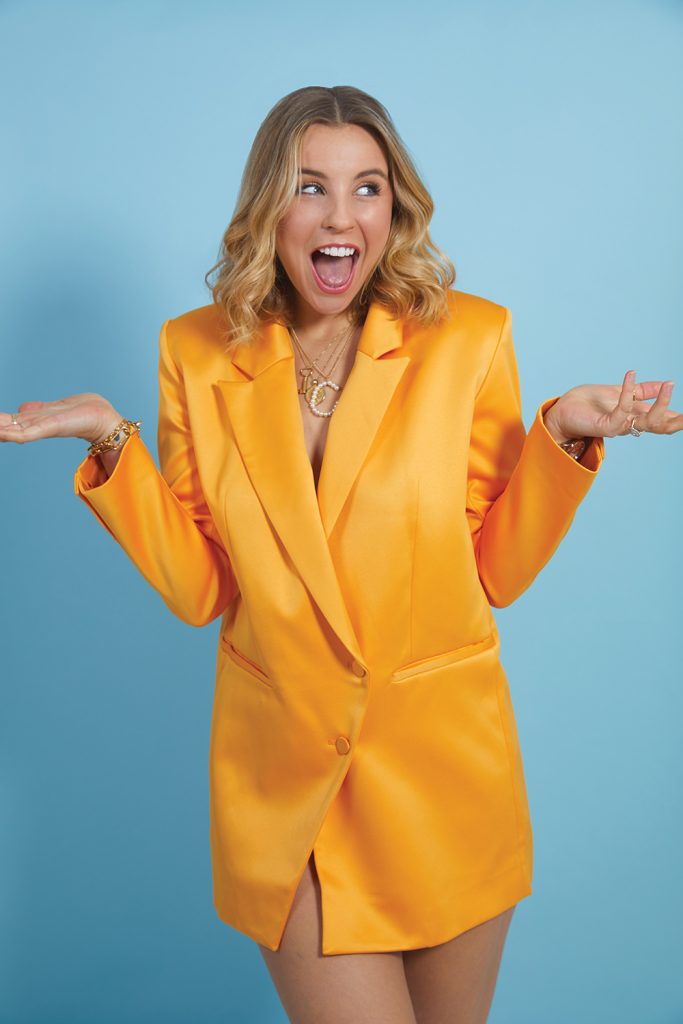
How do you use sponsorships with big brands to further communicate your message of self-love? How do you balance promoting self-love and also promoting products through sponsorships?
I feel a responsibility to look after my followers and to put the right things out there, which is why I’m so selective with who I work with on sponsorships or ADbasis, but I don’t feel like I’m weighed down by this constant feeling where I have to post everyday, and keep up this false sense of – because I am just me, offline, online, personally, privately, and publicly. I feel like I’ve taken away that pressure because I don’t care how I’m perceived because I’m just like, well it’s me. For some people, my posts might not resonate with them and that’s absolutely fine. That’s why there are so many people to follow on Instagram, because you find people that you really really want to listen to and there are some that maybe you don’t connect with, but that’s the joy of life and of humankind. That’s why there are so many different messages out there, whether it’s body confidence or veganism or sustainability or a political point of view, I just think you learn so much from other people’s views and even if you don’t agree with them it’s where you become a more complex character.
How important do you think education around invisible illnesses is? What can be done to help?
Invisible illnesses are something that I talk about. Matthew my fiancé is type 1 diabetic, and has been since he was 14. I’m deaf and I have tinnitus with a heart condition. I think there’s so much stigma behind hearing aids, and I try and shatter those stereotypes and be like, ‘hey, I was 23 when I lost my hearing and I got a hearing aid’. It’s made me a more compassionate and empathetic person because I realise that so many people are going through all these things behind the layer of what we can see.
If you delve deep inside them then there is so much to be told that you can’t see on the surface, and that’s made me a kinder person, because I won’t react to someone pushing me in the street, or maybe barging past me to get on the tube. I just think, maybe they’re visually impaired, or anxious and they need to get somewhere – all of this just gives me that real understanding of other people, and in turn has made me a nicer person.
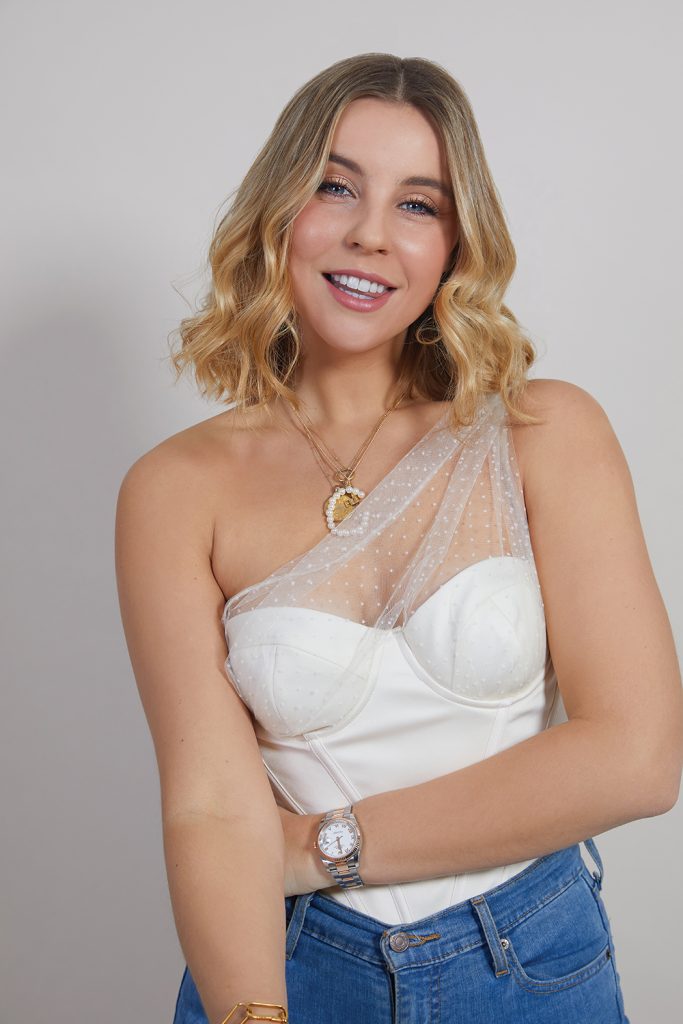
How does your work with body confidence translate into the offline world?
For me the offline world is incredibly powerful, and I feel like it’s something that we’re all deficient in, that faceto- face communication and that real human connection. I feel like it’s becoming less and less as these social media platforms become bigger and bigger. Going into schools and universities and speaking to, not just students, but their parents and their teachers, and just helping to support all three communities, so the parents, teachers and students who really need the same messaging, but maybe a different way of relaying it.
I think for me it’s using what I put online, but then just getting people all in a room, at events or when I go into these schools, to just show them that there is so much more to life than social media. There are so many more interesting things about you as a human than just how you look and the people that love you, the people that are around you every single day, your solar support system, they’re never going to remember you for how you looked.
They’re not going to be at your funeral and think ‘ugh, I loved her abs and I loved the way her legs were so toned and she had that thigh gap’. They’re going to remember you for all the memories that you had with them, all the time that you gave them, the way you made them feel. I just think we forget about that. We all hope not to look back when we’re 80 and think ‘oh god I spent so much of my time perfecting my face or my body, what for?’ Yes, for yourself, and if that helps you feel confident then incredible, but looking back at albums on your phone, or whatever we’ll have in however many years.
Just living for more than how you look, just finding that inner cheerleader and being like ‘no, you know what, you’ve got this, you’ve got so much more value and so much more worth than just your aesthetics’. Something that I talk about a lot, I’ve written a book called ‘Be Your Own Best Friend’, and that is my main messaging because if you can speak to yourself as if you were speaking to your best friend, if you can speak to your body like you would your best friend, then that is so powerful.
Also I think the advice that you give your best friend, whether that’s work, boys, life advice, then you take that advice and think – how would I say that to my best friend Tess, or my best friend Sammy? What advice would I give her if she said ‘oh my god I just hate my tummy’ or ‘I just hate my legs’? What would you say to them? Take that advice and yeah, be your own best friend.
